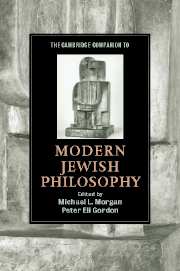Book contents
- Frontmatter
- 1 Introduction: Modern Jewish Philosophy, Modern Philosophy, and Modern Judaism
- 2 Baruch Spinoza and the Naturalization of Judaism
- 3 The Liberalism of Moses Mendelssohn
- 4 Jewish Philosophy after Kant The Legacy of Salomon Maimon
- 5 Hermann Cohen: Judaism and Critical Idealism
- 6 Self, Other, Text, God: The Dialogical Thought of Martin Buber
- 7 Franz Rosenzweig and the Philosophy of Jewish Existence
- 8 Leo Strauss and Modern Jewish Thought
- 9 Messianism and Modern Jewish Philosophy
- 10 Ethics, Authority, and Autonomy
- 11 Joseph Soloveitchik and Halakhic Man
- 12 Emmanuel Levinas: Judaism and the Primacy of the Ethical
- 13 Emil Fackenheim, the Holocaust, and Philosophy
- 14 Evil, Suffering, and the Holocaust
- 15 Revelation, Language, and Commentary: From Buber to Derrida
- 16 Feminism and Modern Jewish Philosophy
- Bibliography
- Index
11 - Joseph Soloveitchik and Halakhic Man
Published online by Cambridge University Press: 28 September 2007
- Frontmatter
- 1 Introduction: Modern Jewish Philosophy, Modern Philosophy, and Modern Judaism
- 2 Baruch Spinoza and the Naturalization of Judaism
- 3 The Liberalism of Moses Mendelssohn
- 4 Jewish Philosophy after Kant The Legacy of Salomon Maimon
- 5 Hermann Cohen: Judaism and Critical Idealism
- 6 Self, Other, Text, God: The Dialogical Thought of Martin Buber
- 7 Franz Rosenzweig and the Philosophy of Jewish Existence
- 8 Leo Strauss and Modern Jewish Thought
- 9 Messianism and Modern Jewish Philosophy
- 10 Ethics, Authority, and Autonomy
- 11 Joseph Soloveitchik and Halakhic Man
- 12 Emmanuel Levinas: Judaism and the Primacy of the Ethical
- 13 Emil Fackenheim, the Holocaust, and Philosophy
- 14 Evil, Suffering, and the Holocaust
- 15 Revelation, Language, and Commentary: From Buber to Derrida
- 16 Feminism and Modern Jewish Philosophy
- Bibliography
- Index
Summary
The modern philosophical critique of revealed religion in general and traditional Judaism in particular has been primarily normative, as opposed to epistemological, in nature. Take Spinoza, for example. While he contrasted theology and philosophy in epistemological terms - inasmuch as theology, in his view, does not possess any truth-value as opposed to philosophy, whose goal is the truth - his primary contrast between the two was normative - inasmuch as he claimed that theology leads only to obedience to God, as opposed to philosophy which gives rise to the love of God. As for the Mosaic Law, for Spinoza it possessed only a purely political significance and lacked any broader moral or spiritual, much less any intellectual value.
Kant adopted Spinoza’s critique of Judaism, and in a similar vein argued that “Strictly speaking Judaism is not religion at all” but “only a collection of merely statutory laws supporting a political state.” Of course, for both Spinoza and Kant, denying any value to Jewish law was tantamount to denying any value to Judaism in toto. By contrast, modern Jewish thinkers who sought to find the significance and value of Judaism as residing in something other than the study and observance of the Law could agree with the view of Jewish law taken by Spinoza and Kant, without believing that they had thereby rejected Judaism as a whole.
- Type
- Chapter
- Information
- The Cambridge Companion to Modern Jewish Philosophy , pp. 209 - 233Publisher: Cambridge University PressPrint publication year: 2007
- 2
- Cited by

